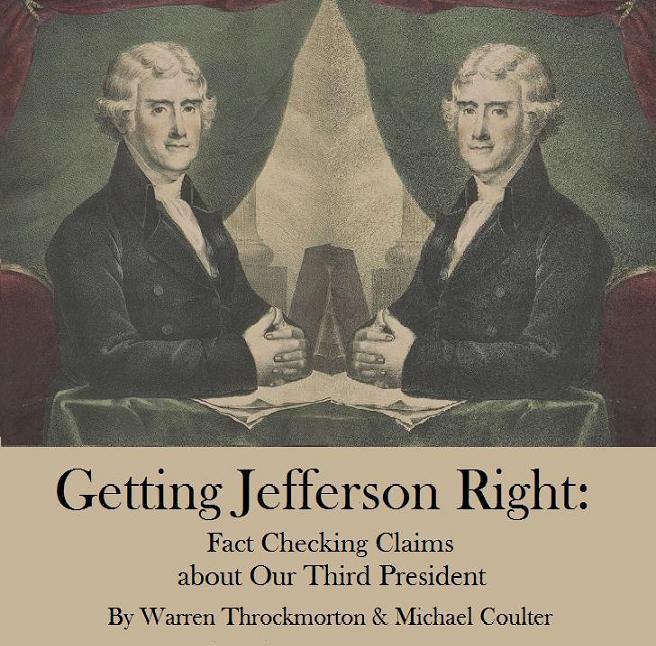Late last night, World Net Daily published another “exclusive” promo piece for David Barton’s The Jefferson Lies. This one focuses on Thomas Jefferson’s relationship to his slaves and repeats Barton’s overconfident denial that Jefferson fathered any of Sally Heming’s children. We did not take up that claim in Getting Jefferson Right because there is no way to know for sure what happened.
However, the unknown author of the WND article then comes after me (and my co-author Michael Coulter without naming him). In his first edition, Barton selectively omitted a section of Virginia’s 1782 law on manumission which allowed slave owners to free slaves by going to the county court house with a “deed of manumission.” He claimed that Virginia law did not allow emancipation. Citing Barton, the WND article doubles down on that claim:
“Numerous historians of previous generations who sought for truth rather than political correctness affirm that the laws of Virginia did indeed forbid Jefferson from doing what he wanted to do throughout his long life: free his own slaves.”
Mr.Barton please name some of those “numerous historians.”
In fact, because of the 1782 law on manumission, many slaves were freed by their owners.
Barton continues:
But Barton says the situation was far more complicated, and takes on Throckmorton’s claim directly in a special section of the new edition. He argues Throckmorton seems to believe only one law governed emancipation in Virginia. In fact, he argues, there were many.
In Getting Jefferson Right, we deal with several relevant Virginia laws, not just one as Barton claims.
Barton asserts:
Because Jefferson suffered severe difficulties throughout his life, Barton says he would be exposing his slaves to possible re-enslavement if he tried to set them free.
Barton observed: “Particularly relevant to Jefferson’s case was a law requiring the economic bonding of certain emancipated slaves… Jefferson… was unable to meet the added financial requirements of that emancipation law.”
We never claimed that it would have been easy for Jefferson to free all of his slaves. We countered Barton’s assertion that Jefferson was not allowed to do so by Virginia law. In fact, there were some restrictions on emancipation for some slaves. On that point, the 1782 Virginia law enumerated the conditions (scroll down to page 39):
II. Provided always, and be it further enacted, That all slaves so set free, not being in the judgment of the court, of sound mind and body, or being above the age of forty-five years, or being males under the age of twenty-one, or females under the age of eighteen years, shall respectively be supported and maintained by the person so liberating them, or by his or her estate; and upon neglect or refusal so to do, the court of the county where such neglect or refusal may be, is hereby empowered and required, upon application to them made, to order the sheriff to distrain and sell so much of the person’s estate as shall be sufficient for that purpose.
Males and females above 45, males under 21, females under 18 and disabled slaves required financial support. However, not all of Jefferson’s slaves fell in those categories. This provision of Virginia law did not prohibit emancipation. Furthermore, during this period of time, Jefferson voluntarily sold over 50 of his slaves to reduce debts, moving them from one condition of enslavement to another.
Barton and WND continue:
Another law applicable to Jefferson also stated, “All slaves so emancipated shall be liable to be taken… to satisfy any debt contracted by the person emancipating them.”
As Jefferson was, in today’s standards, millions of dollars in debt when he died, freeing the slaves might simply lead to them being taken by someone else.
The clause Barton refers to was passed as a part of a 1792 law. In full, the clause provided:
That all slaves so emancipated shall be liable to be taken by execution to satisfy any debt contracted by the person emancipating them, before such emancipation is made. (emphasis added)
Barton omitted the phrase in bold print. After 1792, a slave freed after an owner contracted a debt could be taken by authorities and sold back into slavery with the proceeds going to satisfy the pre-existing debt. However, if a slave was emancipated and then the slave owner went into debt, the slave could not be taken.
Two points should be obvious. First, this clause is a restriction but not a prohibition. Second, there was a ten year window when the 1792 restriction did not apply.
A third point isn’t as obvious because Barton doesn’t address what Thomas Jefferson did while some Virginia slave owners were manumitting their slaves. Jefferson continued to buy and sell slaves during this period. Jefferson even hired slave catchers to track down runaway slaves.
A Challenge to WND
Let me issue a challenge to Barton and World Net Daily: Allow me space to rebut these promo pieces. Stop misrepresenting my arguments and the evidence and link to this post. Right now, your behavior is a right wing version of the liberal bias you assert is true of the mainstream media. If you are so sure you are correct, then have the courage to back it up.
 Here is the press release for Barton’s new TBN dramatization.
Here is the press release for Barton’s new TBN dramatization.
